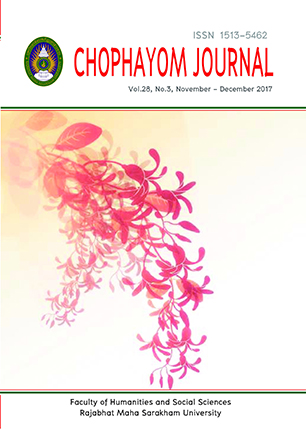PROBLEMS AND FACTORS AFFECTING ENGLISH TO THAI TRANSLATION AMONG THIRD-YEAR ENGLISH TEACHER STUDENTS
คำสำคัญ:
Translation effectiveness, syntactic construction knowledge, syntactic parts, English into Thai translation.บทคัดย่อ
Abstract
The objectives of this research were: 1) to identify the most common problematic syntactic parts that were difficult for translation among third-year English teacher students and 2) to investigate whether there was relation between knowledge of grammar (syntactic construction) and translation effectiveness. The data were collected from 34 third-year Englishteacher students enrolling intranslation I course in the first semester of the academic year 2017. This group of students were purposively selected. The tools for data collection were a translation test containing 19 English sentences and a grammar test. The data were analyzed by frequency, percentage, content analysis, and by Pearson product-moment correlation. The results showed that the three highest-rate syntactic parts that students could not translate correctly were “referred subject”, “perfect participle adverb phrase” and “specific words”. Other difficult parts for students to translate correctly
were“past participial adjective”, “present participleas adverb phrase”, “passive voice verb”, “special verb (interest, surprise)”, “adverb before adjective”, “using noun as adjective”, and “present participialadjective”. In terms of relation between knowledge of grammar (syntactic construction) and translation effectiveness, the research findings revealed that students’ scores from the grammar (syntactic construction) test were significantly positively related to their rates of correct translation (p<.001). Keywords:Translation effectiveness, syntactic construction knowledge, syntactic parts, English into Thai translation.






